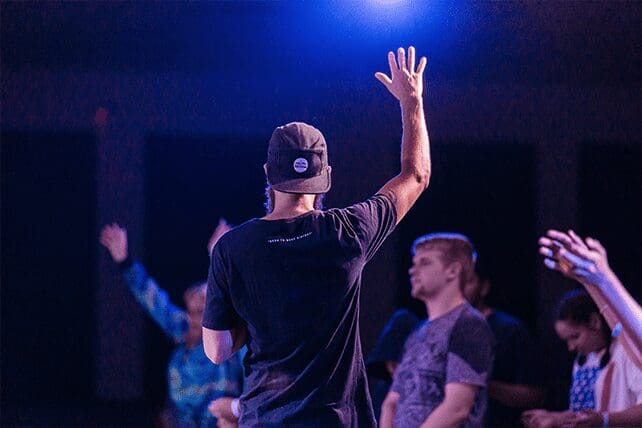(RNS) — “When students come back at semester breaks, that’s when the conversations really pick up,” said Jon-Michael Phillips, 35, a youth pastor at a nondenominational church in Jackson, Michigan, a city of about 31,000 between Ann Arbor and Lansing, the state’s two big college towns.
As students from the University of Michigan and Michigan State return home for the holidays, Phillips is less concerned about college football rivalries than about the political discussions he is bound to have. “Every year, students want to talk to me about things they are struggling with,” he said, “and one of the topics a few are sure to bring up is politics.”
Phillips said students often share that when it comes to LGBT issues, the environment or the Republican Party, they increasingly feel at odds with the politics they often heard from the pulpit as they grew up or what was shared at home.
As they become more politically aware and active, Phillips said, they start to question how their evangelical Christian parents and pastors have presented these issues and others.
“The nice thing is they still want to talk and want to know what I think,” Phillips said. “The question is what I can do with these conversations.”
According to a recent report from Neighborly Faith and Springtide Research Institute, young evangelicals are highly politically engaged, and they continue to be inspired, and influenced, by pastors and other spiritual leaders at their church.
The study, which surveyed 1,989 young adults ages 18 to 25, oversampling for evangelical and born-again young adults, sought to trace who young evangelical adults are listening to in their political, social and religious lives and to provide recommendations on how spiritual leaders can best partner with them for social change.

Kevin Singer. Photo courtesy of Springtide
The report suggests that young evangelicals’ political activities — from community service and volunteer work to activism as well as their voting patterns or attitudes toward the “religious other” — tend to align with their religious leaders’ emphases. The study reported that among other Christians and people of other faiths, evangelical young adults were the only group to say religious texts and leaders influenced how they felt about political issues or participated in their communities.
Kevin Singer, president of Neighborly Faith and Springtide’s head of media and public relations, said the finding that young evangelicals are inspired by their faith leaders and Scripture was expected. “What is especially striking, however, is how much more young evangelicals are inspired by their faith leaders,” Singer said. “The influence of the pastor seems to be alive and well in the lives of young evangelicals.”
Daniel Bennett, professor of political science at John Brown University, a private Christian school in northwestern Arkansas, and a consultant on the survey, said he sees young people coming to university with an earnest desire to make sense of the world around them and act accordingly.
Saying he was passionate about making sure students get faith-filled formation, Bennett was encouraged that young evangelicals continue to turn to pastors, Bible study leaders and other church mentors for advice on how to be politically engaged.
“At college, young evangelicals are disrupted in a sense,” Bennett said. “They are learning how to think, how to wade through religious, cultural and political diversity and difference.”

